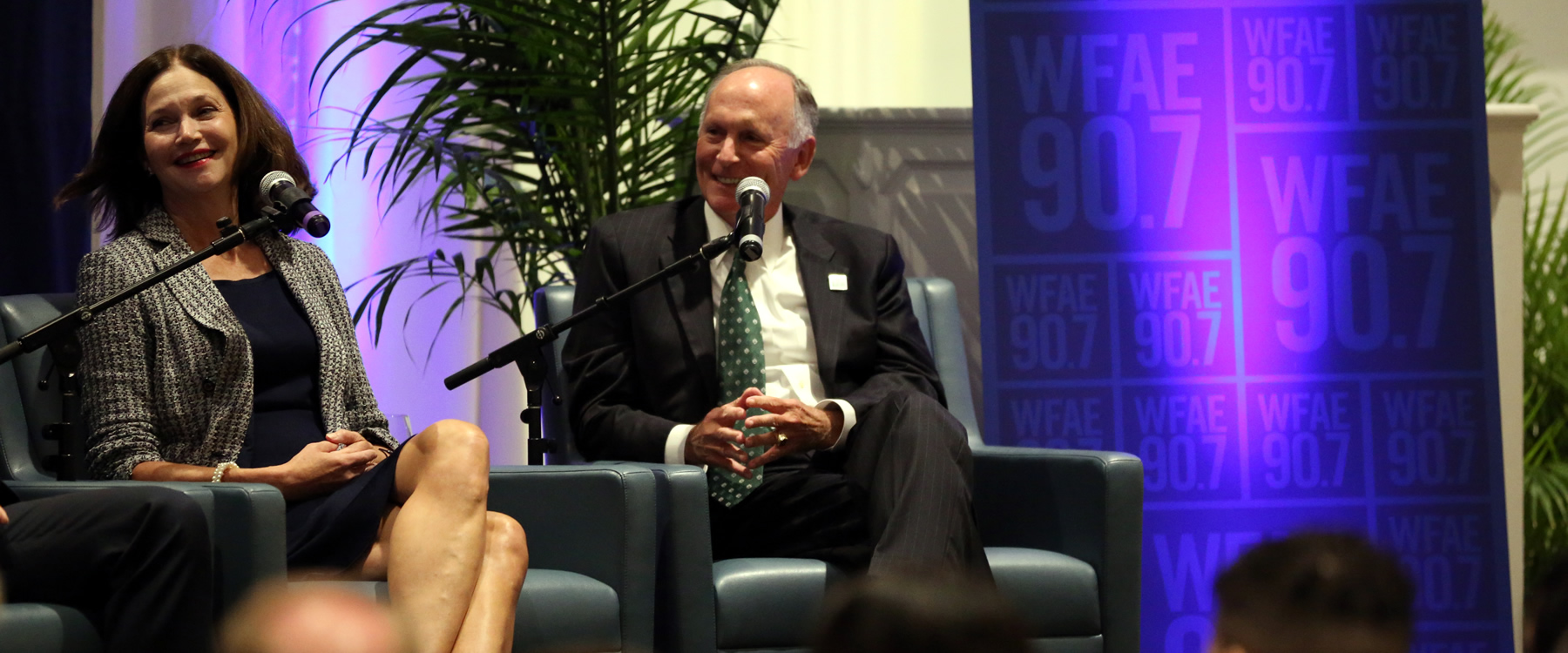
UNC Charlotte Chancellor Philip L. Dubois joined the leaders of four other Charlotte-area colleges to discuss the future of higher education on Wednesday, Oct. 16.
This discussion, held in front of a full house at the Belk Chapel on the campus of Queens University of Charlotte, was moderated by Mike Collins of WFAE’s Charlotte Talks and included the presidents of Johnson C. Smith University, Central Piedmont Community College, Queens University of Charlotte, Davidson College and UNC Charlotte. Each of the participants, who represented a different part of the higher education landscape, touched on a variety of topics including college affordability, the value of education and preparing students for the workforce.
Here’s a snippet of what Chancellor Dubois said in the discussion:
1. College affordability
“We’ve tried to do everything we can at UNC Charlotte to keep cost affordable, to increase our private philanthropic resources, to carefully manage the University budget, but it’s always a struggle. About two-thirds of our students are on financial aid and, of the aid they receive, about two-thirds are in the form of loans. So, a UNC Charlotte student that graduates, one-third of them will have no debt, two thirds of them will and on average that debt will be $25,000.”
Host Mike Collins mentioned the increased costs of college resulting in mounting student debt across the nation. He posed the question of how to deal with this challenge at both a public and private institution. In laying out the University’s efforts at managing costs, Dubois noted how this issue is very personal to him. As a first-generation college student, he acknowledges that he was only able to receive his education, which he credits as changing his life, because of the access to an affordable institution in California at the time.
2. Value of education
“Not only is there a public good to what we do, there’s an immense private benefit. If you have a college degree, or at least some college, you’re going to have higher lifetime earnings, higher annual earnings; you’re going to be more likely to be employed, less likely to be laid off; you’re going to be healthier, less likely to be on social welfare; you’re less likely to get in trouble with the law; you’re more likely to vote and more likely to be philanthropic in your community.”
Following the discussion of affordability, the panelists addressed the value of education. With much of the national dialogue centered on the increased cost and whether a college degree is worth it, the panelists weighed in on the benefits of a college degree and how it serves the broader community in many ways that make the investment in education worthwhile.
3. Student preparation
“The corporate and business community are very important in helping to prepare students. For example, Bank of America and UNC Charlotte have a program together called the Applied Technology Program. It’s an internship program with the bank co-taught with faculty and bank supervisors of the interns. It ends up that 95 percent of the students who go through this program get permanent employment with the bank. That’s a win-win for everybody, they realize they need these students and work with us to help produce them.”
Central to the mission of each of the institutions represented on the panel is the topic of student preparation. While each institution serves a different section of the community, the panel agreed on the importance of working together to create opportunities, whether it be joint degrees or broadening access to the community college system that ultimately funnels students into the four-year institutions.
In closing, Dubois mentioned that Charlotte-Mecklenburg Schools is an important partner for each of the panelists as it serves to provide a diverse mix of students to each of the institutions represented.
Listen to the entire Charlotte Talks panel discussion on WFAE’s website.